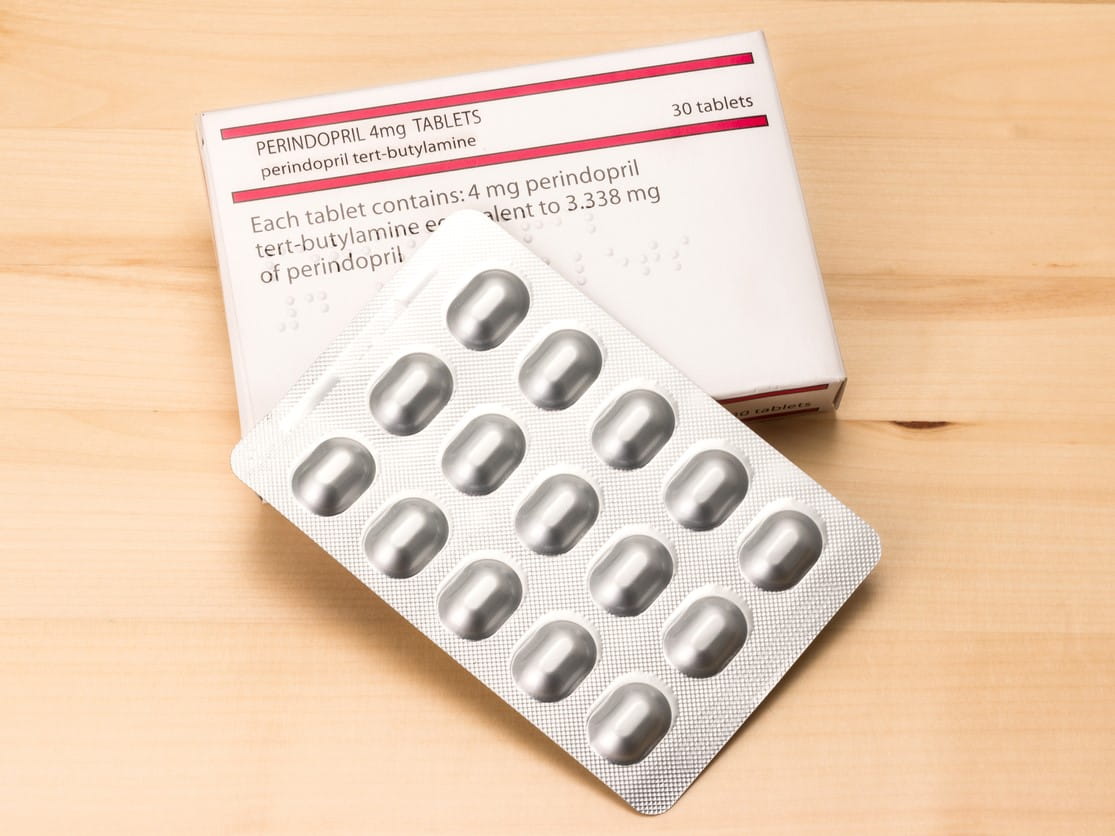Risks and Side Effects of Perindopril

The Bottom Line
Perindopril is a medication used to treat heart conditions such as high blood pressure. It is part of a commonly prescribed class of drugs called angiotensin-converting enzyme, or ACE, inhibitors. These drugs are generally well tolerated but have been associated with drug-induced cough and a potentially serious adverse reaction called angioedema.

The Full Story
Perindopril (Aceon®) is a prescription medication that is used to treat certain cardiovascular conditions such as high blood pressure, heart failure, and stable coronary artery disease. It is currently available in 2-, 4-, and 8-mg tablets and is usually taken once a day. Perindopril is one of a class of widely prescribed drugs called angiotensin-converting enzyme inhibitors or “ACE inhibitors” for short. Other common drugs in this class include lisinopril, enalapril, and benazepril.
ACE inhibitor generic names all end in “-pril” and these drugs all work in a similar way. These medications lower blood pressure by inhibiting ACE (angiotensin-converting enzyme), which is the enzyme that converts inactive angiotensin I to the active form, angiotensin II. Angiotensin II is a protein hormone that helps regulate blood pressure via vasoconstriction (narrowing of blood vessels). Too much angiotensin II can be a contributing factor to high blood pressure and other heart conditions. ACE inhibitors like perindopril help to block this pathway to assist with lowering blood pressure.
Although generally well tolerated, the most common side effects of perindopril have been reported to be cough, dizziness, and back pain. The side effect of coughing is common with this class of medication. The reason for this cough is not entirely clear, and its occurrence in patients is variable (3.9–35%). It is typically described as a nonproductive, dry cough and can occur within hours after a first dose or even weeks to months later. Although generally harmless, it can be very annoying for people who experience it and can lead patients to stop taking their medication.
A potentially serious adverse reaction to perindopril is a reaction called angioedema. Angioedema typically presents with painful swelling and redness around the eyes, cheeks, lips, or throat. In addition to ACE inhibitors, other drugs that have been associated with angioedema include certain NSAIDs (nonsteroidal anti-inflammatory drugs) and antibiotics. Angioedema occurs in 0.1-0.7% of ACE-inhibitor-treated patients with Blacks, women, older patients, and smokers having an increased risk. Some cases can be mild, but in severe cases of angioedema swelling of your throat or tongue can lead to a blocked airway, which can be life-threatening. In mild cases, angioedema typically resolves on its own over the course of several hours or days and might not require intervention or treatment. However, it is important to be aware of the symptoms of angioedema and to seek medical evaluation and emergency treatment if you feel your breathing could be impaired.
If you have questions about an adverse reaction or possible overdose of perindopril, check the webPOISONCONTROL® online tool or call Poison Control at 1-800-222-1222 for help 24 hours a day, every day.
Kristina Yee, PharmD
Certified Specialist in Poison Information
Poisoned?
Call 1-800-222-1222 or
Prevention Tips
- Always keep prescription and over-the-counter medications in child-resistant containers and away from children and pets.
- Ask your pharmacist and physician about potential drug interactions between perindopril and your other medications. Include all prescription, over-the-counter, and herbal medications you take.
This Really Happened
A man called Poison Control after his wife took her daily perindopril 4-mg dose at 4 PM and then mistakenly again at 10 PM. She had been on the medication for several years and was not reporting any symptoms. They were able to take her blood pressure at home, and it was 104/66 mmHg. Poison Control advised that it would be OK to monitor her at home, but because it might cause dizziness she should be careful to avoid falls when getting up during the night. When Poison Control called the next day, the woman reported that no symptoms developed overnight.For More Information
Perindopril (oral route). Rochester (MN): Mayo Foundation for Medical Education and Research [updated 2021 Feb 01, cited 2021 May 25].
What should I know about ACE Inhibitors? Am Fam Physician. 2002 Aug 1;66(3):473.
References
Aceon prescribing information. Berkeley (CA): XOMA; 2012 Mar [cited 2021 May 24].
Yilmaz I. Angiotensin-converting enzyme inhibitors induce cough. Turk Thorac J. 2019 Jan;20(1):36–42.
Poisoned?
Call 1-800-222-1222 or
Prevention Tips
- Always keep prescription and over-the-counter medications in child-resistant containers and away from children and pets.
- Ask your pharmacist and physician about potential drug interactions between perindopril and your other medications. Include all prescription, over-the-counter, and herbal medications you take.
